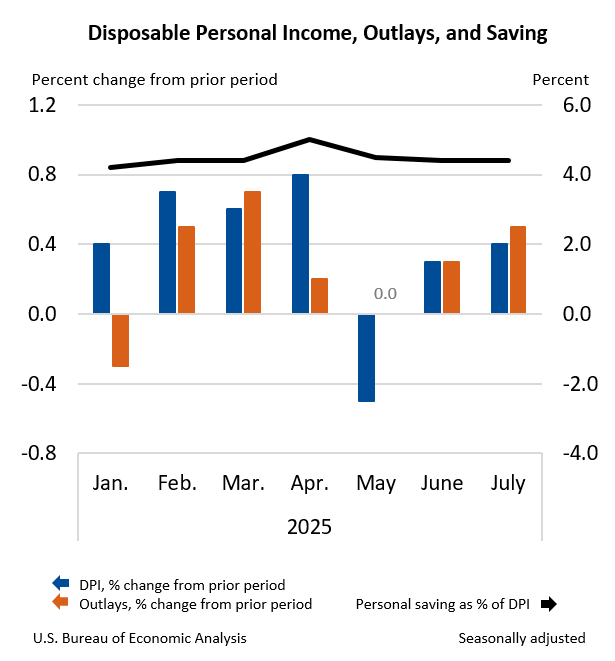Bureau of Economic Analysis
Personal Income and Outlays, July 2025
Personal income increased $112.3 billion (0.4 percent at a monthly rate) in July, according to estimates released today by the U.S. Bureau of Economic Analysis. Disposable personal income (DPI)—personal income less personal current taxes—increased $93.9 billion (0.4 percent) and personal consumption expenditures (PCE) increased $108.9 billion (0.5 percent). Personal outlays—the sum of PCE, personal interest payments, and personal current transfer payments—increased $110.9 billion in July. Personal saving was $985.6 billion in July and the personal saving rate—personal saving as a percentage of disposable personal income—was 4.4 percent.
Principal Federal Economic Indicators
Noteworthy
- 2025 News Release Schedule
- Innovation at BEA
- 2025 Annual Updates
- Distribution of Personal Income Nowcast
- New! Services Trade Data for More Countries
- Data Tool: Trade in Value Added
- Updated: RIMS II Regional Multipliers
- Arts and Culture
- Space Economy
- FDI Now in State BEARFACTS
- Quick Guide: Price Indexes
The Latest
GDP Increases in Third Quarter
Real gross domestic product (GDP) increased 3.5 percent in the third quarter of 2016, according to the “third” estimate released by the Bureau of Economic Analysis. The growth rate was 0.3 percentage point higher than the “second” estimate released in November. In the second quarter, real GDP rose 1.4 percent.
Personal Income and Outlays, November 2016
Personal income increased $1.6 billion (less than 0.1 percent) in November according to estimates released today by the Bureau of Economic Analysis. Disposable personal income (DPI) decreased $1.3 billion (less than 0.1 percent) and personal consumption expenditures (PCE) increased $24.0 billion (0.2 percent).
Gross Domestic Product, 3rd quarter 2016 (third estimate); Corporate Profits, 3rd quarter 2016 (revised estimate)
Real gross domestic product increased at an annual rate of 3.5 percent in the third quarter of 2016 (table 1), according to the "third" estimate released by the Bureau of Economic Analysis. In the second quarter, real GDP increased 1.4 percent. The GDP estimate released today is based on more complete source data than were available for the "second" estimate issued last month.
State Personal Income: Third Quarter 2016
State personal income growth decelerated to 1.1 percent on average in the third quarter of 2016 from 1.2 percent in the second quarter. Personal income grew in every state in the second-quarter with growth rates ranging from 0.4 percent in Oklahoma to 1.4 percent in South Dakota.
State Quarterly Personal Income, 3rd quarter 2016
State personal income growth decelerated to 1.1 percent on average in the third quarter of 2016 from 1.2 percent in the second quarter, according to estimates released today by the U.S. Bureau of Economic Analysis. Personal income grew in every state in the second-quarter with growth rates ranging from 0.4 percent in Oklahoma to 1.4 percent in South Dakota (table 1).
New Statistics on the Activities of U.S. Multinational Enterprises are Now Available
Detailed statistics on the worldwide activities of U.S. multinational enterprises in 2014, including the finances and operations of U.S. parent companies and their foreign affiliates, are now available from the U.S. Bureau of Economic Analysis.
U.S. Current-Account Deficit Decreases in Third Quarter 2016
The U.S. current-account deficit decreased to $113.0 billion (preliminary) in the third quarter of 2016 from $118.3 billion (revised) in the second quarter of 2016. As a percentage of U.S. GDP, the deficit decreased to 2.4 percent from 2.6 percent. The previously published current-account deficit for the second quarter was $119.9 billion.
U.S. International Transactions, 3rd quarter 2016
Current Account Balance The U.S. current account deficit decreased to $113.0 billion (preliminary) in the third quarter of 2016 from $118.3 billion (revised) in the second quarter of 2016, according to statistics released by the Bureau of Economic Analysis (BEA).
Gross Domestic Product for the U.S. Virgin Islands Increases
After declining for four consecutive years, the Virgin Islands’ economy grew in 2015. Real GDP — adjusted to remove price changes—increased 0.2 percent in 2015, after decreasing 1.0 percent in 2014. For comparison, real GDP for the United States (excluding the territories) increased 2.6 percent in 2015 after increasing 2.4 percent in 2014.
Travel and Tourism Spending Accelerated in the Third Quarter
Real Tourism Spending. – Real spending on travel and tourism accelerated in the third quarter of 2016, increasing at an annual rate of 5.0 percent after increasing 4.5 percent (revised) in the second quarter according to new statistics released by the Bureau of Economic Analysis. By comparison, real gross domestic




